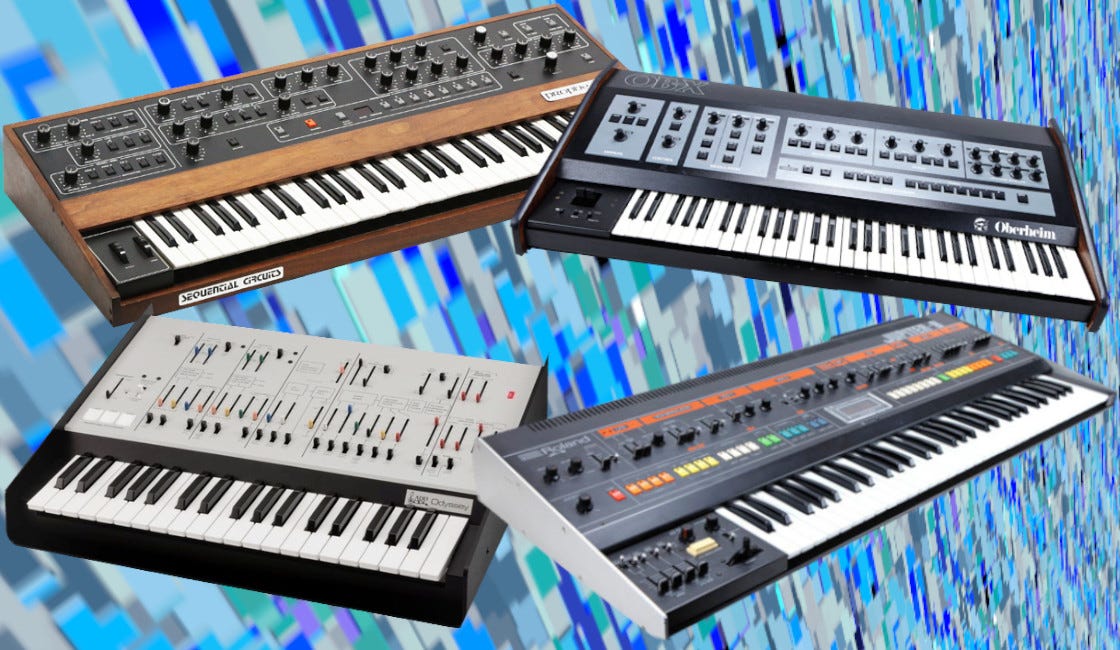
The 1980s saw the introduction of the LM-1 drum machine and the Yamaha DX7 synthesizer, two of the most influential musical tools ever made. These tools helped usher in the sound of the 80s: punchy digital drums, glittering synths, and a echo-y, maximalist atmosphere.
The sound of the 80s was such a dramatic shift from what came before that it became an instant identifier in the cultural memory. People couldn’t get enough of this 1980s sound, and its reverberations continue to be heard in modern pop music.
But in 40 years after the synth went mainstream, we still associate this instrument with its birth decade. Vulture wrote a 2016 article called “The 50 Best Modern Songs That Sound Like the 1980s”, which covers everything from funky tracks like “King Kunta” (Kendrick Lamar) & “Uptown Funk” (Mark Ronson) to modern synthpop classics like “The Mother We Share” (CHVRCHES) & “Oblivion” (Grimes).
This list’s cohesion is so weak that I suspect the author just wanted an excuse to share their favorite songs. And that’s okay! But classifying everything from a diverse genre like synthpop as just “80s” does a disservice to modern musical discourse, as well as what made the 80s sound so unique.
The signature of the 1980s wasn’t the synths themselves, but this sense of playfulness. Synths were totally new, and producers were excited to see all the crazy stuff that they were capable of. For me, the quintessential 80s artist was Prince. In addition to being a talented singer and instrumentalist, they were at the forefront of all this electronic innovation as well. And you can absolutely hear that in their music: just take a listen to “Batdance” (1989). This bizarre #1 hit has an irreverent, experimental style that you just don’t hear on the radio anymore.
One of Prince’s favorite new toys was gated reverb, a distinctive punchy drum sound created by messing with a drum’s natural echo. Vox did a great video on gated reverb called “How a recording-studio mishap shaped '80s music” where they describe how Prince aided in the development of this sound.
Gated reverb undeniably has an 80s vibe about it, especially since it largely faded away between the 1980s and the late 2010s. But the gated reverb sound that has emerged in the 2020s is domesticated: it’s lost that ‘80s wildness of doing things in the studio just because they can. There’s a big difference between doing something because it’s novel and doing something because it’s tried-and-tested. If I hear a gated reverb preset on a pop track, I don’t think “80s” any more than I think “50s” when I hear electric guitar. While they were novel in their respective decades, these tools have been throughly integrated into the culture. Perhaps future generations will associate this new gated reverb with the 2020s in the same way that we associate it with the 1980s today!
Now this doesn’t mean that all comparisons to the 1980s are spurious. CHVRCHES’ “The Mother We Share” fits the bill: while its production has an undeniably modern polish, you can still feel that youthful, playful maximalism on the track. (The record’s debut status adds to this effect.) And certain songs, like Carly Rae Jepsen’s “When I Needed You” are intentional homages to the 80s style.
But many of these 80s comparisons rely on the prominence of the synth alone, an association that becomes more outdated with every passing year. Take “Oblivion” by Grimes: a song that Pitchfork called “tailor-made for the exact moment when aliens lower their drawbridge onto Earth”. “Oblivion” may be synth-forward, but it’s not 80s. The sound is subdued, polished, and most of all mature. Heck, the signature lead of “Oblivion” is a GarageBand loop: an artifact firmly rooted in the 21st century.
So say it with me: synthpop! The 1980s were a great decade for music, and it makes sense to want to link synthpop to that nostalgia. But at a certain point, we have to realize that synthpop is all grown up. It’s time for our terminology to grow up, too.
—K



Couldn't agree more!
Just added Batdance to my obsessions :)